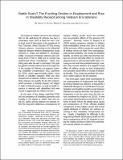Battle Scars? The Puzzling Decline in Employment and Rise in Disability Receipt among Vietnam Era Veterans
Author(s)
Autor, David H.; Duggan, Mark G.; Lyle, David S.
DownloadAutor_Battle scars.pdf (82.79Kb)
OPEN_ACCESS_POLICY
Open Access Policy
Creative Commons Attribution-Noncommercial-Share Alike
Terms of use
Metadata
Show full item recordAbstract
The impact of military service in the Vietnam
War on the well-being of veterans has been a
contentious topic since at least the war’s end.
A focal point of discussion is the prevalence of
Post Traumatic Stress Disorder (PTSD) among
Vietnam veterans. According to the influential
National Vietnam Veterans Readjustment Study
(Richard A. Kulka and William E. Schlenger,
1988), 15 percent of Vietnam veterans were suffering
from PTSD in 1988 and 31 percent had
experienced PTSD cumulatively. More than
thirty years after the war’s conclusion, this topic
has gained renewed salience due to the rapid rise
in the number of Vietnam era veterans receiving
Disability Compensation (DC) payments
for PTSD, which approximately tripled—from
90,695 to 268,865—between 1999 and 2010
(Department of Veterans Affairs, various years).
Only veterans can qualify for the DC program,
which provides a monthly stipend, not subject
to state or federal taxation, as well as health insurance
to veterans with disabilities that were
caused or aggravated by military service.
Date issued
2011Department
Massachusetts Institute of Technology. Department of EconomicsJournal
American Economic Review
Publisher
American Economic Association
Citation
Autor, David H., Mark G. Duggan and David S. Lyle."Battle Scars? The Puzzling Decline in Employment and Rise in Disability Receipt among Vietnam Era Veterans." American Economic Review, May 2011. Vol. 101, Iss. 3; pg. 339-344.
Version: Author's final manuscript
ISSN
0065-812X